- SIAM
- ARAI
- Toyota Kirloskar Motor
- BPCL
- Bharat Petroleum Corporation
- Bajaj Auto
- Society of Indian Automobile Manufacturers
- Reji Mathai
- Milind Pagare
- Vikram Gulati
- Prashant K Banerjee
- Anurag Saraogi
- PS Ravi
- Federation of Indian Petroleum Industry
Ethanol Blending: Progress Needs Experiments, Say Officials
- By Mohnish Bose
- August 31, 2025
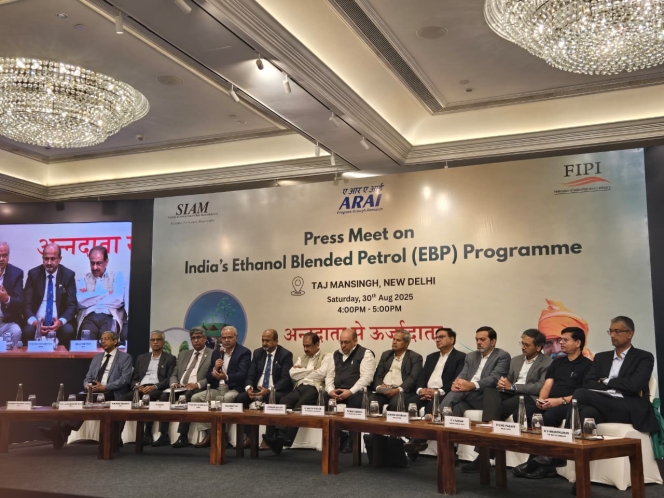
While the need of the hour for the Government of India was to reduce crude oil import, a whopping 85 percent from other countries, and reduce pollution, does the Ethanol Blended Petrol (EBP) program, having generated tremendous furore, truly augur well for India’s automotive future?
Industry leaders from India’s leading oil companies, automotive industry bodies and OEMs came together on 30 August 2025, to discuss its directives, including the employment of sugarcane farmers.
Setting the tone for the evening, Reji Mathai, Director, ARAI (Automotive Research Association of India) spoke about BS6 and BS6 Phase Two as unique current propositions that prepared the ground for ethanol addition into petrol. He mentioned, “While ARAI is responsible for maximum testing, Society of Indian Automobile Manufacturers (SIAM) and oil companies have also played important parts.”
2001 was the year when ethanol blends were first done in India. The systematic sequence of ethanol-based blend tests after the above was as follows:
- 2010- Multiple studies done over 10 percent blending
- 2016- BS4 testing was done on 7–8-year-old vehicles
- 2021- A detailed study was done on 8–10-year-old vehicles
Fuel efficiency will go down
Industry speakers confirmed that fuel efficiency from E20 will decrease by 2-5 percent. However, Prashant K Bannerjee, Executive Director, SIAM, averred, “Fuel efficiency is determined by terrain and driving habits, leading to different experiences for different customers. Owing to complex and variable factors, it cannot always be pointed towards the fuel.” Though better octane numbers have now been attained, the energy generated is six percent lesser than pure petrol.
As a country that has successfully adopted EBP, Brazil, with E27 and an overall blend of 45 percent, was quoted numerous times. Milind Pagare, VP (R&D), Bajaj Auto, shared his views on the company’s two-wheelers sold in India and abroad. He said, “We will always provide fuel-related help to our customers whenever necessary. However, I’m sure that there will be no catastrophic engine failures due to EBP.”
Experiments are necessary for progress
“Experiments will keep happening; otherwise, we can’t go ahead. We will always rely on scientific studies for progress,” said Mathai. Although he could not give a figure when asked about the E20-compliant percentage on Indian roads, he stated that the industry has tested two-wheelers which are 10 years old and four-wheelers between 8-10 years of age for the blend in 2016 and 2021, respectively. Mathai said, “We couldn’t say anything for sure when E20 came in 2021.”
Bannerjee assured that, “OEMs will have no warranty-related changes due to EBP. Whatever is committed to the customer at the time of sale will be honoured fully. Neither warranty nor insurance will be impacted by the above.”
Most attendees were of the opinion that OEMs and oil companies were not providing any clarity about E20-related faults. Ascertaining the need for the above, Bannerjee said, “We need to clearly articulate about the fuel to our customers. This can be done through a series of summary statements that could be press releases or FAQs.” He said that the statements will be released on the SIAM, ARAI, or OEM pages at the earliest.
He further added, “Most OEMS have or are in the process of communicating to dealers that E20 can be used in E10 vehicles without any concern.” In other words, E20 will cause no problems on any vehicles, including the ones that are marked E5-E10. Specific models of the two-wheelers and four-wheelers have been tested BS3 onwards and he mentioned that no vehicle has encountered engine failure due to E20 to date, after testing over 100,000 kilometres. The setting up of an arbitrary testing agency across vintages and makes of vehicles was also mentioned.
India becomes self-sufficient in ethanol distillation
Anurag Saraogi, Chief General Manager, Bharat Petroleum Corporation (BPCL) expressed contentment at attaining a high level of energy security in India. Backing up the above with figures, he averred, “Eight billion litres of distilleries have come up over the years, and the best part is that these are entirely indigenous.”
Ethanol is prepared from sugarcane, maize and other grains, after which it is mixed with petrol. As UP, Maharashtra and Karnataka are the three major Indian sugarcane states, the oil industry formed long-term agreements with entrepreneurs for country-wide provision. The quantity from sugar molasses has gone up to 3.5-3.7 billion litres today.
Maize is the leading provider of ethanol, contributing 40 percent. Today, maize farming is more viable than ever before, with farmers being recognised as ‘Urjadaatas’ (energy-givers). They’re being offered INR 72 per litre to grow more maize for ethanol and have been paid INR 400 billion in 2025. Payments are being made to the farmers alone.
PS Ravi, Director, Federation of Indian Petroleum Industry (FIPI), said, “In 2014, we achieved a 1.5 percent blend, resulting in 380 million litres of ethanol. While E10 was made available across India in 2019, we have been able to get to 7.5 billion litres by 2025. At this rate, we can safely target procurement and blending of 11-12 billion litres by 2026.” Adding to this, he said, “India is already setting up pilot plants for using high agri residues to prepare the second generation of ethanol.”
Talking about pricing, Ravi said, “The procurement price of ethanol is much more than cost of petrol. Yet, the oil industry is still maintaining a constant price despite Minimum Selling Prices (MSPs) and higher ethanol being derived from feedstock.
Apart from the above, the industry experts expects India to save INR 1,440 billion in terms of FOREX. As a low-carbon intensity fuel, it will easily achieve net-zero emissions, resulting in a cost-effective pathway for energy transition.
Vikram Gulati, Executive Vice-President, Toyota Kirloskar Motor (TKM), said, “Through its 2070 emission plan and circular economy, India will become the global reference model. Farmers will spend more, contributing to the economy.”
- VinFast
- Investor of the Year
- Urban Electric Vehicle of the Year
- VinFast VF 7
- Motor Vikatan Awards 2026
VinFast Wins Dual Honours In India For Investment And Electric SUV
- By MT Bureau
- January 31, 2026
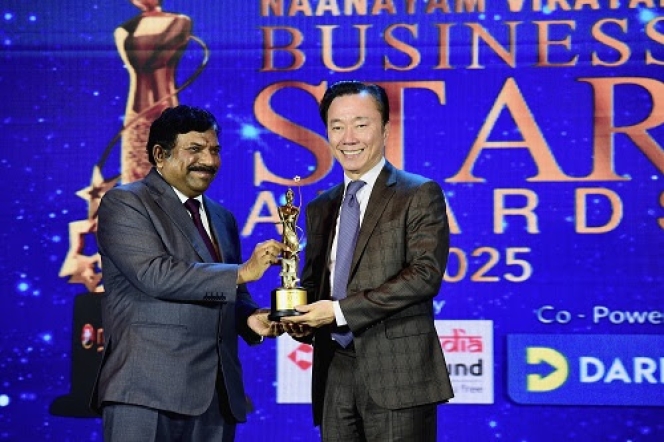
VinFast’s strategic progress in India has been further validated through recent accolades from the influential Vikatan Group media network. The company was distinguished with two significant awards: one recognising its substantial investment commitment, and the other honouring its VF 7 model as the premier urban electric vehicle for 2026. These commendations underscore the brand’s deepening integration into the Indian automotive sector, highlighting both its industrial strategy and its product relevance.
The title of Investor of the Year, conferred by Nanayam Vikatan business magazine, specifically acknowledges VinFast’s landmark commitment to establishing an electric vehicle manufacturing facility in Thoothukudi, Tamil Nadu. This project is noted not only for its scale and strategic clarity but also for its anticipated role in fostering a new industrial corridor, generating employment and bolstering the local supplier network. It aligns with national initiatives like Make in India and reflects confidence in the region’s manufacturing potential.
Concurrently, the VF 7 electric SUV was named Urban Electric Vehicle of the Year at the Motor Vikatan Awards 2026. This recognition from automotive experts underscores the model’s successful adaptation to India’s urban driving conditions, balancing design, performance, safety and comfort. It serves as a testament to VinFast’s product development focus and its localisation strategy aimed at meeting specific market demands.
As a respected media institution in South India with a legacy dating to 1926, the Vikatan Group’s awards carry considerable weight among businesses and consumers. These latest honours add to a growing list of VinFast’s achievements in the market, illustrating the convergence of its investment, manufacturing, and product efforts. Within a short timeframe, the company has employed a long-term strategy encompassing manufacturing, retail, charging infrastructure and after-sales services. Through this comprehensive approach and a focus on sustainable innovation, VinFast is steadily building its brand presence while contributing to India’s transition towards green mobility.
Pham Sanh Chau, CEO, VinFast Asia, said, “Being recognised in two important award categories demonstrates how VinFast is steadily building its position in India, not only through long term investment commitments but also through products developed to match local conditions and user needs. This recognition provides further momentum for us to accelerate implementation, expand the electric vehicle ecosystem, and maintain a long-term partnership with the Indian market.”
B Srinivasan, CEO, Vikatan Group, said, “VinFast India represents the new-age investor – bold in vision, swift in execution and deeply aligned with India’s growth story. By unravelling the true potential of the port city of Thoothukudi, VinFast India has helped create a conducive industrial ecosystem, played a positive role in employment generation and restored the city’s importance on India’s manufacturing map. Their investment is not just capital at work but confidence in India’s future.”
Blue Energy Motors And HPCL Forge Nationwide Pact For Electric Truck Battery Swapping
- By MT Bureau
- January 30, 2026
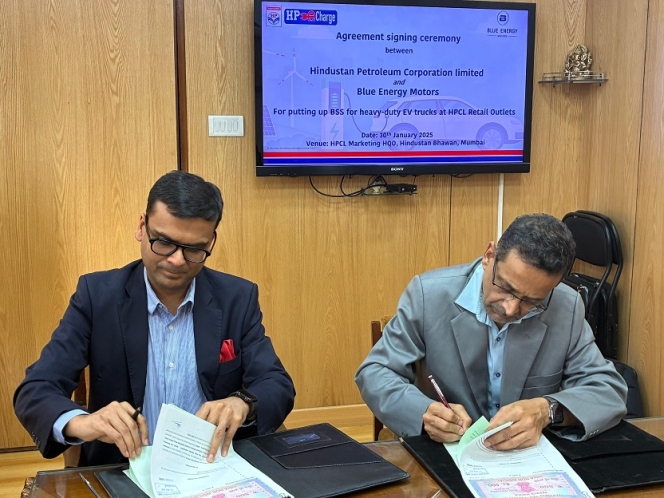
Blue Energy Motors and Hindustan Petroleum Corporation Limited (HPCL) have entered a strategic partnership to deploy Battery Swapping Stations for electric commercial trucks at select HPCL fuel outlets nationwide. This initiative leverages HPCL’s extensive network of over 24,400 retail locations to create a widespread and convenient energy infrastructure for freight operators. By situating swap stations within established fuelling hubs, the collaboration seeks to make electric mobility a practical and scalable reality for India’s logistics sector.
The core advantage of battery swapping lies in its dramatic reduction of energy replenishment time to under five minutes, minimising vehicle downtime compared to conventional charging. For fleet operators, this efficiency translates into higher vehicle utilisation, improved productivity and more predictable scheduling. Furthermore, a growing and accessible network of swap stations alleviates range anxiety, enabling electric heavy-duty trucks to confidently undertake longer routes and multiple shifts.
As India advances its green transportation goals, this alliance holds significant strategic value. HPCL’s vast retail footprint, which already supports over 5,400 EV charging points under its HP e-Charge brand, offers a ready platform for rapid infrastructure deployment across key freight corridors. Blue Energy Motors, a pioneer in zero-emission freight solutions, brings its expertise in electric commercial vehicles, exemplified by its launch of India’s first electric freight corridor. Together, the companies aim to accelerate electric vehicle adoption by directly addressing the operational needs of commercial fleets, thereby strengthening the long-term development of sustainable freight transport in the country.
- Eicher Trucks and Buses
- VE Commercial Vehicles
- VECV
- India Book of Records
- IBR
- Eicher Pro X
- Vinod Aggarwal
- SS Gill
- Abhishek Chaudhary
Eicher Pro X EV Completes Kashmir To Kanyakumari Journey In 6 Days
- By MT Bureau
- January 28, 2026
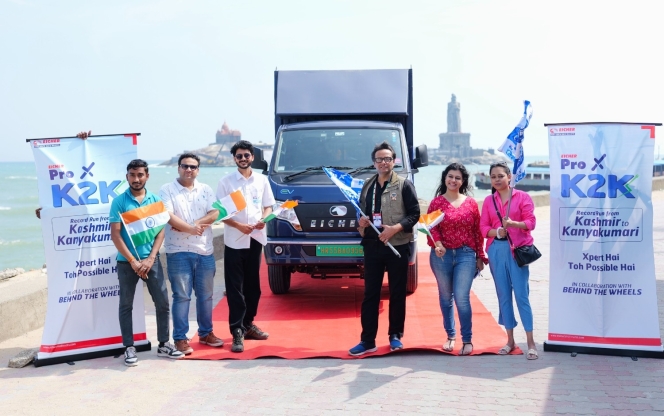
Eicher Trucks and Buses, part of VE Commercial Vehicles (VECV), has completed a journey from Kashmir to Kanyakumari using its Eicher Pro X EV.
The record verified by the India Book of Records (IBR), saw the electric vehicle cover over 4,000 kilometres in 6 days under loaded conditions. The run commenced in Srinagar on 20 January 2026 and concluded in Kanyakumari on 26 January 2026, traversing the Himalayas, plains and the Deccan Plateau.
Throughout the expedition, the vehicle utilised public chargers located via the MyEicher App. An adjudicator from the India Book of Records accompanied the truck to monitor route compliance, load, distance and charging stops. The mission served as a demonstration of electric vehicle endurance across diverse altitudes and climates to validate the technology for logistics corridors.
The journey was intended to show that electric commercial vehicles can operate beyond short-haul deliveries. By maintaining performance across hilly and coastal routes, the Pro X EV aimed to establish total cost of ownership (TCO) benefits and maintenance predictability for fleet operators. The successful completion of the route suggests that current charging infrastructure can support long-haul electric freight movement.
Vinod Aggarwal, MD & CEO, VE Commercial Vehicles, said, “For more than four decades, Eicher trucks and Buses have earned customer trust through leadership in fuel efficiency and application-specific engineering. The record-setting performance of the Eicher Pro X reinforces our unwavering focus on application excellence, reliability, and performance, anchored in robust product development and manufacturing capabilities, and enabled by a customer-centric, pan-India commercial and dealer network. I commend the entire Eicher team for achieving these well-deserved records”.
SS Gill, Chief Commercial Officer, VE Commercial Vehicles, said, “By covering the K2K route with a loaded Pro X EV, Eicher Trucks & Buses has proven that electric mobility is no longer restricted to short-haul, ‘last-mile’ deliveries. We are not just setting records, but through the strength of our service network and extensive dealer set-up, we are demonstrating that our EV technology is commercially viable, reliable, and has the range to serve as the backbone of India’s green logistics corridors”.
Abhishek Chaudhary, SVP – SCV Sales & Marketing, VE Commercial Vehicles, said, “The Eicher Pro X EV was put to the ultimate test – covering over 4000 kilometres across diverse climates and challenging altitudes. With this recognition from the India Book of Records we’ve moved beyond our own stringent testing benchmarks to real-world validation - Demonstrating that Eicher Pro X EV is a dependable partner for logistics movement across varied operations in India”.
- Montra Electric
- Murugappa Group
- PM E-Drive Scheme
- Rhino 5538 EV 6x4 Tractor trailer
- Narendra Modi
- H D Kumaraswamy
- Arun Murguappan
- Sathia Raj
- UltraTech Cement
Montra Electric Becomes First OEM To Receive PM E-Drive Certification For Heavy Trucks
- By MT Bureau
- January 28, 2026
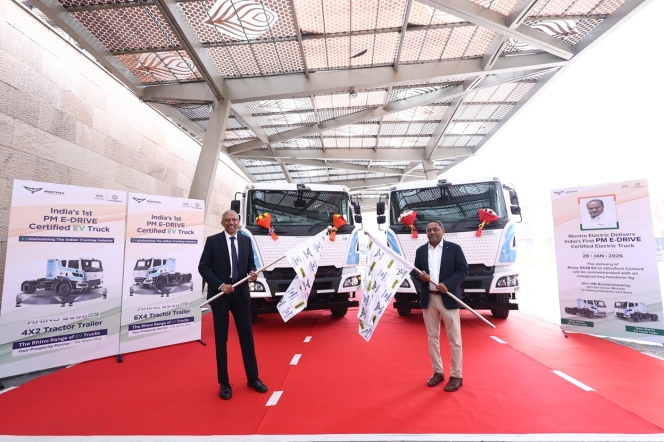
Montra Electric, the electric medium and heavy commercial vehicle business of the Murugappa Group, has become the first manufacturer in India to receive certification for heavy-duty electric trucks under the government's PM E-Drive Scheme.
To mark the achievement, the company delivered a Rhino 5538 EV 6x4 Tractor trailer to UltraTech Cement. The handover took place in the presence of Arun Murugappan, Chairman of Montra Electric and Sathia Raj, Chief Procurement Officer of UltraTech Cement.
The PM E-Drive scheme includes a budget of INR 5 billion specifically for electric trucks, providing a benefit of up to INR 960,000 per vehicle for the Rhino 5538 EV. This incentive is intended to lower operating costs and reduce exposure to fuel price volatility for fleet operators in the logistics, mining, and manufacturing sectors. The Rhino 5538 EV range is designed for Indian conditions and is available in 6x4 and 4x2 variants.
The Rhino 5538 EV 4x2 variant features a 282 kWh LFP battery that produces 380 HP and 2000 Nm of torque. It offers a range of approximately 198 km under standard test conditions and supports six-minute battery swaps. These specifications suit the vehicle for high-utilisation applications in ports, steel plants, and cement logistics.
H D Kumaraswamy, Union Minister for Heavy Industries, said, "The PM E-Drive scheme is a testament to the growing prowess of Indian innovation in the heavy-duty electric vehicle segment. Under the visionary leadership of Prime Minister Narendra Modi, we are committed to decarbonizing our logistics and making India a global hub for EV manufacturing. Electric trucks are pivotal to our Net Zero goals, and by fostering a self-reliant ecosystem through such certifications, we are driving the spirit of Atmanirbhar Viksit Bharat. We are very happy to see our Prime Minister’s vision coming to life with the 1st PM E-Drive certified heavy duty electric truck from 'Montra Electric' getting delivered today."
Arun Murugappan, Chairman, Montra Electric, said: “Decarbonising freight is one of the most critical challenges in India’s energy transition. We are grateful to the Government of India and our Prime Minister Narendra Modi for introducing forward-looking and progressive policy frameworks such as the PM E-Drive Scheme, which represent a welcome and transformative step in accelerating this shift, particularly in heavy commercial vehicles where emissions intensity is high. At Montra Electric, we are proud to contribute to this national mission by delivering technologically advanced, reliable, and scalable electric M&HCV solutions that can drive meaningful and lasting change in India’s mobility ecosystem.”








Comments (0)
ADD COMMENT